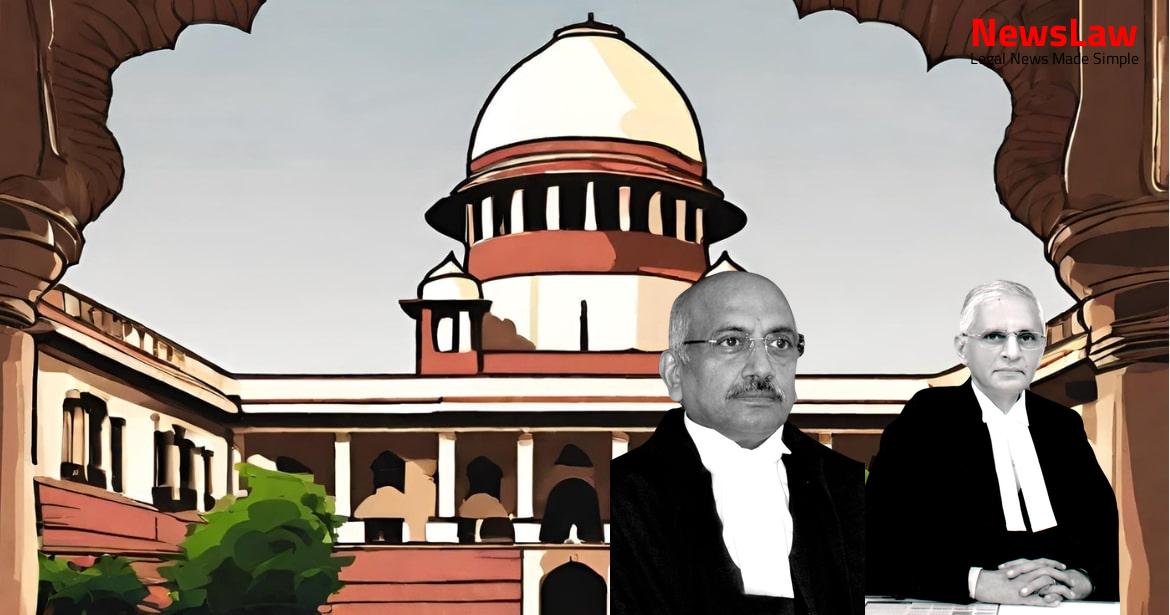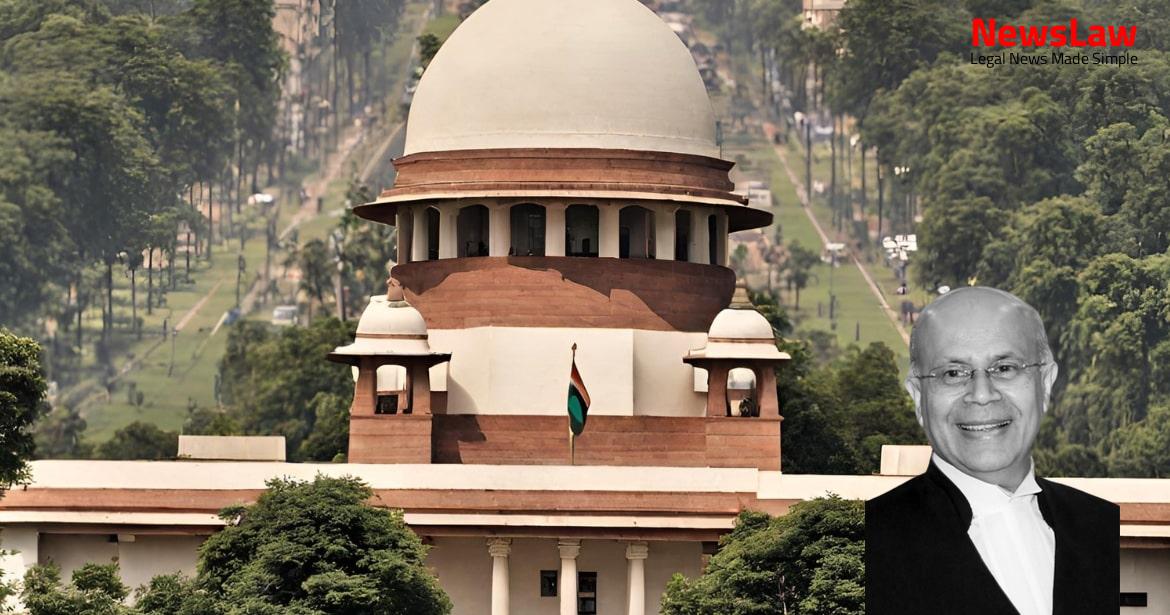Explore the detailed legal analysis of a case involving lease termination and breach in government property. The court’s examination of the lease terms, including clauses on subletting and assignment, sheds light on the complexities of upholding contractual obligations. Discover how the court navigates the principles of forfeiture, waiver, and equitable considerations in the context of government-owned land lease agreements.
Facts
- Mr. K.K. Joseph executed a registered sale deed in 1983 transferring 50 acres to Mr. Raghavan from the land leased to him.
- Mr. P.I. Joseph bid for 246.26 acres from the South Block in 1955 and took possession on 10.05.1955.
- Writ Appeals were filed by M/s. Joseph & Company and the State of Kerala due to being aggrieved.
- There was a notification in 1953 auctioning abandoned portions of Beatrice estate by the erstwhile Travancore-Cochin Government.
- Government of Kerala executed a lease deed in 1979 in favor of Mr. K.K. Joseph although he was representing the partnership firm M/s. Joseph & Company.
- Allegations were made against Mr. K.K. Joseph for transferring his leasehold right to the firm without approval and later retiring in 1988.
- A notice was issued in 1999 to Mr. K.K. Joseph regarding the termination of the lease on 246.50 acres.
- Various legal proceedings followed, including an appeal which resulted in the High Court overturning the termination of the lease.
- The order dated 10.07.2015 by the High Court was challenged by the appellant-State of Kerala in this case.
- Ms. Meera Scaria became the Managing Partner of M/s. Joseph & Company after Mr. K.K. Joseph retired from the firm.
- The default can be confirmed only if the same is not remedied despite notice.
- Clause 12 in the lease deed stated that defaults could be remedied if the lessee is put on notice.
- The Division Bench supported the conclusion that M/s Joseph & Company is the lessee.
- The transfer of 50 acres to Mr. Raghavan was considered a breach, upheld as a finding of fact not open for interference.
Also Read: Supreme Court Upholds Rejection of Plaint Under Order VII Rule 11 of CPC: A Critical Analysis
Issue
- Clause 12 of the lease deed allows the lessor to terminate the lease if the lessee defaults on any covenants.
- The lessee must vacate the leased land upon termination, and the lessee is liable for any losses incurred by the lessor due to the default.
- Clause 14 of the lease deed prohibits the lessee from subletting or assigning the lease without prior written permission from the lessor.
Also Read: Validity of Debt and Enforcement of Section 138 NI Act
Arguments
- Respondent contends that there was no non-compliance of Clause 12 before termination of the lease as per Clause 14.
- Respondent argues that under Section 111(g) of T.P. Act, the entire lease cannot be forfeited even if breach is proven.
- Claim of waiver of forfeiture based on Clause 12 and Section 112 of T.P. Act is refuted due to transfer of lease to M/s. Joseph & Company.
- Reference made to a Calcutta High Court decision regarding acceptance of rent after notice to quit as waiver of termination.
- Strict construction of the right to forfeit lease under Section 111(g) of TP Act is emphasized against the lessor.
- The contention that M/s. Joseph & Company continued in possession even after sale is rejected on the grounds of breach.
- Failure to comply with Clause 12 of the lease agreement is highlighted as a reason for setting aside the lease termination order.
- Argument that the lessee should have been notified to remedy default before lease termination is raised, with reference to a letter from the lessee seeking to rectify the default.
- The sale of the property under the registered sale deed dated 16.12.1983 is not in dispute.
- The key question is whether this sale constitutes a breach of the terms in the lease deed that would lead to the termination of the lease.
- Mr. Joseph Markos argued that although the sale deed was executed, possession of the property was not handed over to Mr. Raghavan, and the lessee M/s. Joseph & Company continued to pay lease rentals for the entire property.
Also Read: Enlargement on Bail in Illegal Mining Case
Analysis
- The breach of the lease deed, particularly in relation to subletting or assigning without prior permission, is deemed significant and not rectifiable under Clause 12.
- The distinction between ‘default’ and ‘breach’ is noted, with ‘breach’ indicating a clear violation of the lease terms without mandatory remediation.
- Acceptance of lease rentals does not equate to condoning the breach, as the lessor’s right to terminate remains intact.
- The sale deed transferring 50 acres of the leased land indicates a clear breach of Clause 14, as possession was transferred without lessor’s consent.
- Attempts by the lessee to remedy the default after the fact, such as assigning back the land, do not absolve the breach initially committed.
- A forfeiture under section 111, clause (g) can be waived.
- Waiver can occur through acceptance of rent that has become due since the forfeiture.
- Waiver can also occur through distress for such rent or any other act showing intention to treat the lease as subsisting.
- Lessors must be aware that the forfeiture has been incurred for waiver to be valid.
- Acceptance of rent after the institution of a suit to eject the lessee on the ground of forfeiture does not constitute waiver.
- In the case A. Venkataramana Bhatta and Ors. vs. Krishna Bhatta and Ors AIR 1925 Madras 57, the High Court considered the case against forfeiture of the entire lease when there was a partial alienation.
- Equitable principle was applied where the lessee himself was the owner of the property and had mortgaged it.
- Forfeiture was limited to the portion mortgaged to a third-party mortgagee after obtaining it on lease.
- In Cook vs Shoesmith (1951) 1 KB-752, the tenant sublet two rooms of the house breaching the agreement.
- In Grove vs Portal 1902 1 CH 727, the tenant was not allowed to sublet the fishing area without lessor consent.
- The court ruled based on Lord Elson’s dictum that the undertaking not to sublet the premise was not broken.
- In Shanti Prasad Devi v. Shankar Mahto, it was held that there was no breach of the agreement despite a transfer.
- In Swarnamoyee Debya vs Aferaddi and Ors. AIR 1932 Calcutta 787, no forfeiture was incurred due to unauthorized transfer.
- Keshab Chandra Sarkar and Ors. vs Gopal Chandra Chanda AIR 1960 Calcutta 609, plaintiff sued for recovery of possession due to unauthorized transfer of leased land.
- In the case of Sh. Shiam Behari Lal Gour and Others vs Madan Singh AIR (32) 1946 Allahabad 298, a suit was decreed for a declaration that the lease rights of the defendants in the leased land have been determined and the plaintiff is entitled to possession.
- The main point of consideration was whether the plaintiff is entitled to such a declaration based on the events that have occurred and whether there has been forfeiture.
- It was established that the law leans against forfeiture.
- General principles of equity from Grove vs Portal have been the basis for conclusions in most cases.
- The leased land belongs to the government and leasehold rights are auctioned for revenue, benefiting the citizens.
- Forfeiture clause cannot be strictly enforced against the lessor when government property is involved.
- Lessee cannot claim benefit under Section 111(g) of the T.P. Act; parties are governed by the lease contract terms.
- Equitable principles must be applied based on the facts of each case; ‘he who seeks equity must do equity’ maxim applies.
- Strict adherence to lease terms is required, such as not subletting without permission, breach cannot be condoned.
- The breach in this case involves the lessee executing an absolute sale deed of government land, which cannot be condoned.
- Court refrains from interfering with interim orders.
Decision
- The order dated 10.07.2015 passed by the Division Bench in W.A.No.369/2011 and W.A.No.375/2011 is set aside.
- The appeals from SLP(C) Nos.879-880/2016 are partially allowed with no costs.
- The appeals from SLP (C) No.9661/2017 and SLP(C) No.18760/2016 are disposed of.
- All pending applications are also disposed of.
- Parties are to maintain the status quo until further instructions from the High Court.
- The High Court is directed to dispose of the writ proceedings in accordance with the law.
- The payment of Rs. 45,000 grants absolute right and possession of the land in the schedule.
- The property in the schedule belongs to the Cochin Government with leasehold rights.
- The High Court shall consider the case on its own merits.
- Taxes to the Government are to be paid by the possessor of the land.
- The price decided for the land is Rs. 45,000.
- The order dated 17.01.2011 in W.P.No.1207/2005 passed by the Single Judge is restored.
- The possessor is allowed to keep and enjoy the absolute right of the property with the right of transport.
- The lease rent is to be paid directly to the Government from now on.
Case Title: STATE OF KERALA Vs. M/S JOSEPH AND COMPANY (2021 INSC 442)
Case Number: C.A. No.-005117-005118 / 2021



